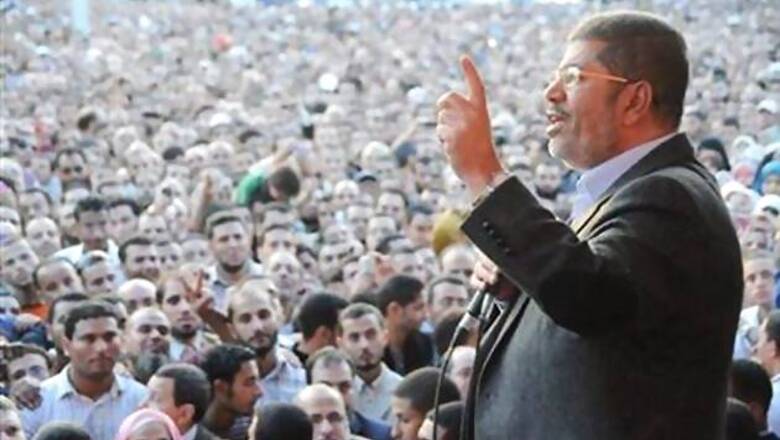
views
Cairo: More than 100,000 Egyptians protested outside the presidential palace in Cairo on Tuesday, fueling tensions over Islamist leader Mohammed Morsi's seizure of nearly unrestricted powers and the adoption by his allies of a controversial draft constitution.
The outpouring of anger across the Egyptian capital, the Mediterranean port of Alexandria and a string of other cities pointed to a prolonged standoff between the president and a newly united opposition. Morsi's opponents, long fractured by bickering and competing egos, have been re-energized since he announced decrees last month that place him above oversight of any kind, including by the courts, and provide immunity to two key bodies dominated by his allies: The 100-member panel drafting the constitution and parliament's upper chamber.
The decrees have led to charges that Morsi's powers turned him into a "new pharaoh." The large turnout in Tuesday's protests - dubbed "The Last Warning" by organizers - signaled sustained momentum for the opposition, which brought out at least 200,000 protesters to Cairo's Tahrir Square a week ago and a comparable number on Friday to demand that Morsi rescind the decrees.
The huge scale of the protests have dealt a blow to the legitimacy of the new constitution, which Morsi's opponents contend allows religious authorities too much influence over legislation, threatens to restrict freedom of expression and opens the door to Islamist control over day-to-day life. What the revived opposition has yet to make clear is what it will do next: campaign for a "no" vote on the draft constitution in a nationwide referendum set for December 15, or call on Egyptians to boycott the vote.
Already, the country's powerful judges have said they will not take on their customary role of overseeing the vote, thus robbing it of much of its legitimacy. Morsi was in the presidential palace conducting business as usual as the protesters gathered outside. He left for home through a back door as the crowds continued to swell, according to a presidential official who spoke on condition of anonymity because he was not authorized to speak to the media.
The official said Morsi left on the advice of security officials to head off "possible dangers" and to calm the protesters. Morsi's spokesman, however, said the president left the palace at the end of his normal work day, through the door he routinely uses. The protest was peaceful except for a brief outburst when police used tear gas to prevent demonstrators from removing a barricade topped with barbed wire and converging on the palace.
The protesters covered most of the palace walls with anti-Morsi graffiti and waved giant banners carrying images of revolutionaries killed in earlier protests. "Down with the regime" and "No to Morsi," they wrote on the walls. "He isn't the president of all Egyptians, only of the Muslim Brotherhood," said protester Mariam Metwally, a postgraduate student of international law. "We don't feel like he is our president."
A giant poster emblazoned with an image of Morsi wearing a Pharaonic crown was hoisted between two street light posts outside the presidential palace. "Down with the president. No to the constitution," it declared. "The scene at Itihadiya palace is a stab at the president's legitimacy and his constitutional declaration," opposition leader Hamdeen Sabahi told a private TV network. "The scene sends a message to the president that he is running out of time."
The massive gathering was reminiscent of the one outside the palace on February 11, 2011 - the day authoritarian president Hosni Mubarak stepped down in the face of an 18-day uprising that ended his 29-year regime. Shouts of "Erhal! Erhal!" - Arabic for "Leave! Leave!" - and "The people want to topple the regime!" rose up from the crowd, the same chants used against Mubarak. This time, though, they were directed at his successor, Egypt's first democratically elected president.
"The same way we brought down Mubarak in 18 days, we can bring down Morsi in less," Ziad Oleimi, a prominent rights activist, told the crowds using a loudspeaker. Earlier Tuesday, several hundred protesters also gathered outside Morsi's residence in an upscale suburb. "Down with the sons of dogs. We are the power and we are the people," they chanted.
Morsi, who narrowly won the presidency in a June election, appeared to be in no mood for compromise. A statement by his office said he met Tuesday with his deputy, his prime minister and several top Cabinet members to discuss preparations for the referendum. The statement suggested business as usual at the palace, despite the mass rally outside its doors.
Asked why Morsi did not address the crowds, Muslim Brotherhood spokesman Mahmoud Ghozlan said the protesters were "rude" and included "thugs and drug addicts." The Islamists responded to the mass opposition protests last week by sending hundreds of thousands of supporters into Cairo's twin city of Giza on Saturday and across much of the country. Thousands also besieged Egypt's highest court, the Supreme Constitutional Court.
The court had been widely expected to declare the constitutional assembly that passed the draft charter illegitimate and to disband parliament's upper house, the Shura Council. Instead, the judges went on strike after they found their building under siege by protesters.


















Comments
0 comment